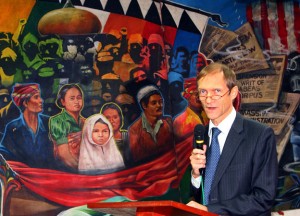European investors want the Aquino administration to further open up certain industries such as energy, services and finance through the revision of the country’s Foreign Investment Negative List (FINL) as soon as possible.
This would enable the Philippines and Europe to double the flow of bilateral trade and investments within five years’ time, said European Union Ambassador Guy Ledoux.
At the sidelines of the Europe Day celebration on Friday, Ledoux noted that as it was, investors from the different member states of the EU were already flocking to the Philippines to tap prospective business opportunities in various industries. The EU remained the biggest foreign investor in the Philippines at 7.6 billion euros.
Ledoux disclosed that many European firms were either engaged or interested in infrastructure, cement production, car parts and other tourism-related industries such as hotels and resorts. More European companies were likewise interested in the country’s business process outsourcing (BPO), which is a fast-growing industry in the Philippines, he added.
There is also a continuous flow of trade and investment missions to the Philippines from the EU member states. A group from Denmark, according to Ledoux, was recently in the country while another from France visited a few weeks ago. The United Kingdom continues to send various missions, while there are delegations coming from Italy, Germany, Sweden and Ireland—all of which are interested in doing business with Philippine companies.
“I think what is suddenly attracting European investors at the moment is the fact that you have a significant improvement in the macroeconomic situation because the Philippines is now investment-grade status. There is a high economic growth and the forecasts are very good,” Ledoux said.
“So European companies are very interested to explore opportunities in this fast-growing market. The index of corruption is improving while the improvement in governance is recognized by many international think tanks. The Philippine government is also committed to make further reforms and there is a plan to revise the foreign investment negative list,” he added. “We are looking forward to the revision of this negative list as soon as possible.”
To further sustain the heightened investor interest from Europe, Ledoux said the Philippine must continue efforts to improve governance, reduce corruption, address the FINL and address the energy supply and price issue.
Meanwhile, Ledoux said it was encouraging to hear that the Department of Trade and Industry was targeting to conclude the scoping agreement before the end of the year. The signing of such an agreement is expected to pave the way for possible negotiations on a free-trade agreement (FTA) between the Philippines and the European Union.
According to Ledoux, a group from the EU would be in the country this June to review the EU’s trade and investment relations with the Philippines and look at the scoping paper to see whether any progress could be made.
Ledoux was also optimistic that Philippine exporters might start benefiting from the expanded trade privileges under the European Union’s new Generalized System of Preferences (GSP) scheme or GSP+ once it has secured an approval of its application before the 28-country bloc.
The approval is seen to increase Philippine exports to the EU by as much as 611 million euros or roughly P38 billion a year. The expanded scheme will eliminate duties on 61 percent of the Philippine products eligible under the general GSP.


